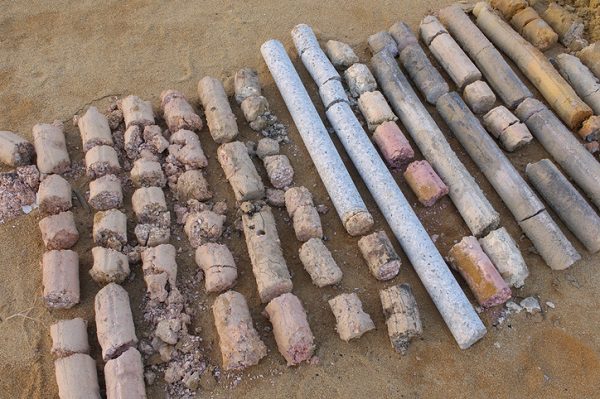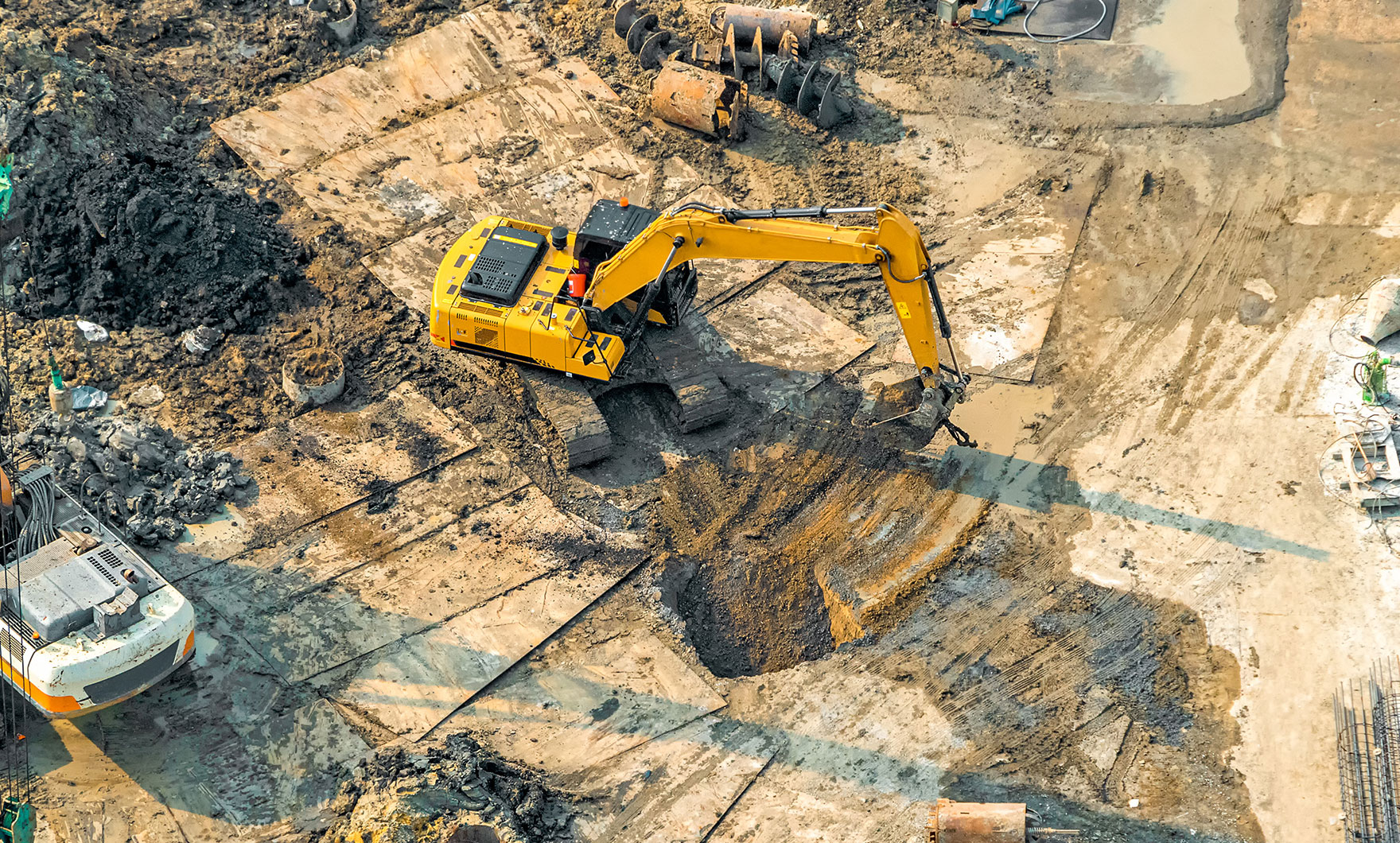Leading Geotechnical Companies in South Africa: Who You Need to Know
Leading Geotechnical Companies in South Africa: Who You Need to Know
Blog Article
The Importance of Geotechnical Engineering in Addressing Environmental Challenges and Enhancing Construction Safety
Geotechnical design offers as a foundation in the junction of environmental stewardship and construction security, providing important understandings right into the actions of soil and rock under different problems. By executing tactical site investigations and customized mitigation procedures, geotechnical engineers play an important duty in protecting both human lives and eco-friendly integrity.

Role of Geotechnical Engineering
Geotechnical design plays a critical role in the design and construction of infrastructure by resolving the actions of dirt and rock materials under different conditions. This area of design is necessary for understanding the interaction between structures and the ground, that includes identifying the load-bearing capability of soil, assessing security, and anticipating potential negotiation or failing.
Geotechnical engineers are responsible for performing site investigations, which involve tasting and testing soil and rock to collect data on their chemical and physical properties. This details is crucial for developing structures, maintaining walls, and various other earth-retaining structures that make certain security and longevity. Geotechnical design educates the choice of ideal building methods and materials, therefore reducing risks connected with dirt behavior.
In addition, the integration of geotechnical design principles right into city planning and ecological administration is important for attending to difficulties such as ground contamination and groundwater monitoring. By recognizing geotechnical elements, designers can create sustainable services that enhance the durability of framework versus natural risks, while additionally advertising ecological stewardship. Ultimately, the function of geotechnical engineering is crucial for achieving risk-free, long lasting, and eco aware construction practices.
Soil Erosion Mitigation
Dirt disintegration postures a substantial threat to both environmental stability and infrastructure stability, affecting around 24 billion bunches of fertile soil lost yearly worldwide. This phenomenon is worsened by aspects such as logging, urbanization, and poor agricultural practices. Geotechnical engineering plays a pivotal role in developing efficient soil erosion mitigation methods that guard both the setting and construction projects.
One method involves the implementation of erosion control approaches such as vegetation planting, which stabilizes dirt via root systems. Additionally, the construction of keeping balconies and wall surfaces can effectively reduce surface runoff and protect vulnerable locations from disintegration. Appropriate drain design is additionally critical; it decreases water buildup and guides excess runoff far from essential frameworks.
Additionally, geotechnical engineers use dirt stabilization strategies, such as the application of geotextiles and naturally degradable mats, to enhance soil cohesion and avoid deterioration - geotechnical engineer description. Regular tracking and analysis of erosion-prone websites enable prompt interventions, guaranteeing long-term sustainability. By incorporating these approaches, geotechnical design not only mitigates the effects of soil erosion yet likewise adds to the durability of framework against ecological obstacles, eventually cultivating a safer and a lot more lasting developed atmosphere
Groundwater Protection Techniques
Groundwater acts as an important source for alcohol consumption water, farming, and commercial processes, making its protection necessary for environmental sustainability and public health. Efficient groundwater protection techniques are essential in alleviating contamination risks and making sure the long life of this source.

Normal tracking of groundwater quality is also crucial, making it possible for very early detection of contamination sources and promoting timely removal initiatives. Utilizing advanced innovations, such as geophysical surveys and remote picking up, aids in determining possible threats to groundwater books.
Additionally, public education and stakeholder engagement are critical, cultivating neighborhood assistance for groundwater security campaigns. geotechnical specialist. By combining governing actions, technological developments, and community involvement, we can produce a detailed framework that safeguards groundwater sources while advertising sustainable advancement and building and construction practices
Landslide Risk Administration
Landslides posture significant risks to both human security and framework, making reliable threat management techniques necessary. Geotechnical design plays an essential function in determining, examining, and mitigating landslide threats. A thorough understanding of slope stability, dirt mechanics, and hydrology is vital for developing effective risk management plans.
The primary step in landslide risk management involves extensive site investigations, which include geological mapping and soil testing. These examinations aid designers review the possibility for landslides by determining important variables such as incline angles, dirt structure, and water material. Using sophisticated innovations such as remote sensing and geophysical surveys can enhance the precision of these analyses.
As soon as dangers are determined, proper reduction steps can be executed. These may include design options such as maintaining walls, drain systems, and slope stabilization strategies. Checking systems ought to be established to identify indications of ground motion and changes in water degrees, allowing for aggressive interventions.

Enhancing Construction Safety
Construction sites typically present a myriad of dangers that can threaten worker security and task honesty. Geotechnical design plays a vital function in improving construction safety by giving vital understandings right into subsurface problems. Via detailed soil and rock evaluation, geotechnical designers can identify prospective threats, such as soil instability, groundwater issues, and seismic vulnerabilities, which might endanger the safety and security of construction activities.
Carrying out geotechnical services, see this here such as proper foundation style and the use of retaining structures, reduces these risks considerably. These services not only Website make sure the security of the frameworks being built but likewise create a much safer working environment for building personnel.
In addition, fostering a culture of safety via training and adherence to developed security protocols even more enhances building and construction website safety. By integrating geotechnical experience right into the preparation and execution stages, building tasks can attain greater safety requirements, inevitably safeguarding employees and making certain successful task conclusion.
Final Thought
In final thought, geotechnical design serves as an important self-control in dealing with ecological difficulties and promoting construction safety and security. With efficient soil disintegration mitigation, groundwater defense strategies, and landslide danger monitoring, geotechnical engineers add to the advancement of resilient framework.
Geotechnical engineering serves as a keystone in the crossway of ecological stewardship and building and construction safety, offering critical understandings into the behavior of soil and rock under different conditions. Geotechnical engineering informs the option of proper building and construction methods and products, thereby lessening threats connected with dirt habits.
Geotechnical engineering plays an essential duty in establishing reliable soil disintegration reduction techniques click resources that guard both the environment and building tasks.
Additionally, geotechnical engineers employ dirt stablizing techniques, such as the application of geotextiles and biodegradable mats, to improve dirt communication and prevent destruction. With extensive dirt and rock evaluation, geotechnical designers can recognize potential dangers, such as soil instability, groundwater problems, and seismic vulnerabilities, which may endanger the security of building and construction tasks.
Report this page